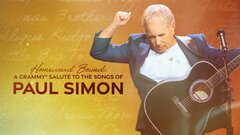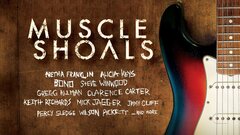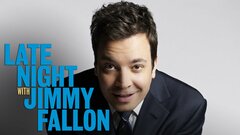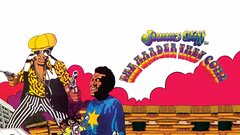Jimmy Cliff

Musician • Actor
Birth Date: April 1, 1948
Age: 76 years old
Birth Place: St. Catherine, Jamaica
An iconic figure in the history of Jamaican music, Jimmy Cliff is a Grammy-winning singer and songwriter whose stirring anthems for liberty and independence helped to define reggae music to the world. Cliff began generating hits as a teenager in the early 1960s with the help of producer Leslie Kong, but soon eclipsed this material after moving to England at the behest of Island Records head Chris Blackwell. He drew inspiration from the country's booming rock and R&B movements, which informed such breakout hits as "Wonderful World, Beautiful People" and "Vietnam."
The 1970s were initially a boom period for Cliff, thanks to his starring role as a musician-turned-outlaw in the cult classic "The Harder They Come" (1972) and its top-selling soundtrack. But Cliff's eclectic sound failed to generate the same attention as his label mate, Bob Marley, in America, and by the end of the decade, his recorded output paled to his popularity as a live act, though he remained in demand throughout the Third World.
From the 1970s onward, his best songs enjoyed a second life through numerous covers by Bruce Springsteen, Keith Richards and others, which in turn led to his induction into the Rock and Roll Hall of Fame in 2009. Cliff's stirring songs and fiercely independent spirit made him a pioneer of reggae music and a spiritual forefather to countless Jamaican artists who followed in his wake.
Born James Chambers on April 1, 1948 in the Somerton District of Jamaica's St. James parish, he and his brother, Victor, were raised by their father, a tailor and farm worker. The youngster took to music at an early age, absorbing songs from DJs playing in his neighborhood and penning his own material while still in primary school. He was soon performing at parish fares, and set out to establish himself as a professional singer.
After moving to Kingston to attend technical school, he began approaching producers to record his songs. In 1961, he serenaded Leslie Kong, the Asian owner of a Kingston ice cream parlor and record store called Beverley's, with a tribute song the establishment called "Dear Beverley." Kong was impressed, and soon established his own label, Beverley's Records, to release Cliff's debut single, "Hurricane Hattie," which featured "Beverley" on the flipside. It rose to No. 1 on the Jamaican charts, and minted the 14-year-old as a rising star in the R&B-driven, proto-reggae music style known as ska. To crystallize his desire to reach the heights of success, James Chambers changed his name to Jimmy Cliff.
Unlike most Jamaican artists who worked with a wide variety of producers and studios, Cliff remained exclusive to Kong throughout the early phase of his career, when he produced such seminal songs as "King of Kings," "One-Eyed Jacks" and "Miss Jamaica." By 1964, Cliff had grown so successful that he was selected to represent Jamaica at the World's Fair in New York.
There, he met Island Records founder Chris Blackwell, who signed him to his label and encouraged Cliff to record in London. There, he faced rejection from producers, who saw ska as a limited style, and racism from aspects of the population, from landlords who refused to rent apartments to non-whites to the government itself, which tried to deport him. But the city's vibrant West Indian community offered spiritual shelter and renewal as he drew inspiration from the explosion of innovative music groups proliferating the country at the time.
He supported himself as a backup singer while assimilating a variety of styles, from soul and R&B to rock into his own work. In 1968, he released "Waterfall," a single penned by members of the progressive rock group Nirvana (not to be confused with the '90s hard rock trio). It captured top honors at a Brazilian music competition, which prompted Cliff to move there for six months.
Cliff's international breakthrough came the following year with the release of the soaring "Wonderful World, Beautiful People," which broke the Top 10 on the U.K. singles chart and reached No. 25 in the United States. The song was one of several hits featured on his 1969 sophomore album, also titled Wonderful World, Beautiful People, including the protest song "Vietnam," which drew effusive praise from Bob Dylan, and "Many Rivers to Cross." A 1970 cover of Cat Stevens' "Wild World" further established Cliff as the rare Jamaican artist with crossover appeal on the international pop charts.
That same year, Cliff was approached by white Jamaican commercial director Perry Henzell about a film project that would reflect both the joys of their country's music, as well as the harsh realities of life for its residents. The following year, Cliff made his film debut in the gritty "The Harder They Come," about an idealistic musician forced into a life of crime when his recording career was met with failure. It was released in Jamaica and several other countries, including England, the following year, where it galvanized audiences with its blend of bleak drama and Cliff's uplifting songs, including the title track, "You Can Get it if You Really Want" and "Sitting in Limbo." For many viewers, the film and its soundtrack served as their first introduction to reggae music, and would be instrumental in spreading the gospel of reggae throughout the world.
The soundtrack for "The Harder They Come" would mark Cliff's final collaboration with Leslie Kong, who died of a sudden heart attack while completing the album. In the wake of Kong's death, Cliff's career would experience a series of setbacks that would prevent him from reaching the heights of fame and respect as that of his Island label mate, Bob Marley. His studio albums for Island, including 1973's Unlimited and 1975's Brave Warrior, were routinely criticized in the press for their polished production and smooth, R&B-influence, which stood in stark contrast to Marley's gritty, deeply spiritual material from the same period.
Cliff also alienated his home fan base by a 1973 visit to Africa that inspired him to convert to Islam, a move that many Jamaicans viewed as a rejection of their culture and national pride. And while The Harder They Come had gained fans throughout many parts of the world, it remained unreleased in the U.S. until 1975. Though the film and its soundtrack would eventually become classics, they had arrived too late on American shores to combat Marley's meteoric rise in that country. The overwhelming response to Marley's music prompted Island to throw its promotional weight behind him, and Cliff soon parted ways with the company to sign with Reprise.
Cliff's tenure with Reprise was noted by many critics for its unevenness, with slick albums like 1976's Follow My Mind standing alongside fiery live recordings like In Concert, which underscored his global popularity as a concert act. Cliff's final album for Reprise was 1981's Give the People What They Want, which essentially summed up his career strategy in its title. Though he had failed to find stardom in major markets like America and Britain, he was hugely popular in Africa and South America, as well as parts of Europe and Asia, and decided to focus his efforts on satisfying his fan base rather than pursue a goal that appeared, for whatever reason, to be constantly out of reach.
At the same time, his classic material remained in circulation thanks to cover versions by a vast array of artists, including Bruce Springsteen, Keith Richards, Willie Nelson, Paul Simon, UB40, Harry Nilsson, Jerry Garcia, Rancid, Trey Anastasio, Fiona Apple and countless others.
Cliff moved to Columbia Records, where he joined forces with Kool & the Gang for a pair of albums, including 1985's Cliff Hanger, which netted a Grammy for Best Reggae Album. He returned to acting in 1986 with the minor comedy "Club Paradise" before severing ties with Columbia in 1989. That year, he formed his own company, Cliff Sounds and Films, which would allow him even greater freedom to pursue his own music. The following year, he made his final screen appearance in "Marked for Death" (1990), a vehicle for action star Steven Seagal.
The year 1993 saw Cliff return to American charts with a cover of Johnny Nash's "I Can See Clearly Now" for the soundtrack for the Disney film "Cool Runnings" (1993). His recorded output slowed in the new millennium, though he remained a popular and vibrant live act. In 2002, he released Fantastic Plastic People, which featured collaborations with the likes of Annie Lennox, Sting and the Clash's Joe Strummer. The following year, Cliff was awarded Jamaica's Order of Merit, the nation's third highest honor, for his contributions to his country's culture.
In 2004, he recast the songs from Fantastic Plastic People in an electronica vein, which were released as part of the album Black Magic. The record was feted by critics and listeners as an innovative comeback, and led to more high-profile performances on the international concert circuit. In 2009, Cliff was inducted by Wyclef Jean into the Rock and Roll Hall of Fame. He continued his experimental phase in 2011 with the critically praised Sacred Fire EP, which was produced by Rancid frontman and longtime admirer Tim Armstrong.
By Paul Gaita
Credits

Homeward Bound: A Grammy Salute to the Songs of Paul Simon

Retro: Endless Summer

Timeline

Dear Jerry: Celebrating the Music of Jerry Garcia

Hit Melody Vintage

Muscle ShoalsStream

Jimmy Cliff Live at the Ogden Theatre

Marley

Late Night With Jimmy Fallon

The Colbert Report

AXS TV Concerts

Tavis Smiley

Jimmy Cliff: Hot Shot

The Reunion

Rude Boy: The Jamaican Don

Reggae: The Story of Jamaican Music

Late Show With David Letterman

Jimmy Cliff: I Can See Clearly Now

Marked for DeathStream

A Reggae Session

Club Paradise

Bongo Man

Austin City LimitsStream

Saturday Night LiveStream

Caiga Quien Caiga

The Harder They ComeStream

The Harder They ComeStream







